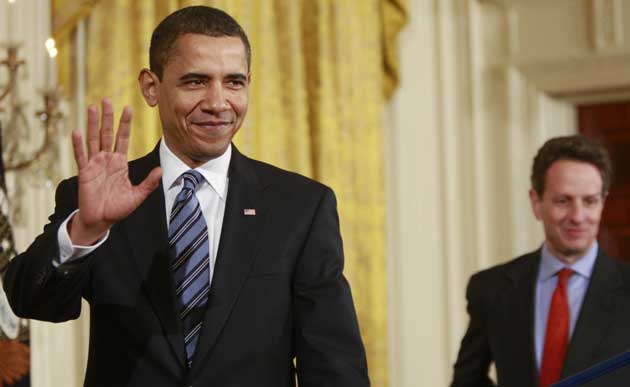Obama feels backlash on 'Main Street' over bailout
Scramble to aid small businesses that employ 70 per cent of workers

Amid the first signs of unease at his handling of the economic crisis, President Barack Obama is channelling fresh aid to America's critically important small businesses, and remobilising the army of internet supporters that helped carry him to electoral victory last November. At a hastily arranged meeting at the White House yesterday, Mr Obama and Timothy Geithner, the Treasury Secretary, announced almost $1bn (£710m) of direct aid to small businesses, coupled with moves to unlock up to $20bn of bank credit for the sector, which employs 70 per cent of US workers.
The purpose of the steps is as much political as economic: to show the administration's focus is firmly on "Main Street" – the ordinary everyday economy – rather than on Wall Street and the financial industry, against which public anger continues to increase. That rose to new heights with the revelation that AIG, the insurance group whose reckless behaviour has required $170bn of government bailout funds, is paying $165m in bonuses to its employees for 2008, including some traders involved in the derivatives business that brought AIG to ruin.
The White House is now scrambling to make sure it does not in turn become the target of populist fury, at a crucial moment for its massively ambitious plans to overhaul the national economy, starting with the $3.55trn budget sent to Congress last month.
"This isn't just a matter of dollars and cents, it's about our fundamental values," the President said yesterday, in a blistering attack on the AIG bonuses. "How do they justify this outrage to the taxpayers who are keeping the company afloat?"
Larry Summers, Mr Obama's top White House economic adviser, described the bonuses as "outrageous", and the Federal Reserve chairman Ben Bernanke said in a rare TV interview that he "slammed the phone more than a few times", when dealing with the consequences of the insurance giant's collapse. "Of all the events in the past 18 months, the single one that makes me the angriest... is the intervention with AIG," Mr Bernanke told the CBS 60 Minutes programme. But, Mr Summers and Mr Geithner maintain, little can be done to rescind the bonuses, previously agreed and contractually binding.
Thus far, Mr Obama's approval rating remains at over 60 per cent. But his advisers are well aware that without improvement, the crisis he inherited will sooner or later be seen as an "Obama crisis", with inevitable repercussions on his popularity and authority. To head off that danger, the White House is reactivating the machinery of the election campaign, but this time to drum up support for the budget, through the email lists of the names of 13 million grassroots supporters.
They will try to ignite a public campaign to force Congress to move quickly on the budget, and its sweeping proposals to raise taxes on the wealthy, make massive downpayments on the President's plans to overhaul health care, and promote green energy.
But it will be an uphill battle. After opposing (with but three exceptions) the $787bn stimulus package, House and Senate Republicans are serving notice they will give the same treatment to the budget, in their view a "recipe for socialism". Some conservative Democrats also have misgivings, especially about the $1.75trn deficit envisaged for the fiscal year 2010, a sum equal to 12 per cent of US GDP, and the highest such proportion since the Second World War.
Join our commenting forum
Join thought-provoking conversations, follow other Independent readers and see their replies
Comments